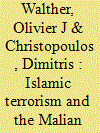|
|
|
Sort Order |
|
|
|
Items / Page
|
|
|
|
|
|
|
| Srl | Item |
| 1 |
ID:
190999


|
|
|
|
|
| Summary/Abstract |
While the location of violent events and their propensity to cluster together in space is increasingly well known, a deeper exploration of their spatiality and spatial evolution over time remains an emerging frontier in “Big Data”-driven conflict studies. The new Spatial Conflict Dynamics indicator (SCDi) introduced in this article contributes to fill this gap, by measuring both the intensity and spatial concentration of political violence at the subnational level. Articulating between point pattern and areal spatial analyses, the SCDi allows conflict researchers and analysts to not just map which regions experience the most violence but to track how the geography of conflict evolves over time. The SCDi identifies four spatial typologies of violence and can leverage political event data from most datasets with locational information and can be used for analyses across large multi-state regions, within a single state, or in more localized contexts. In this paper, we illustrate the SCDi with an application to the case of North and West Africa, analyzing over 30,000 discrete events through a twenty-two-year time span and across a twenty-two-state geographical area. We perform a longitudinal analysis of the SCDi typologies to show how the indicator can inform a theory of the spatial lifecycle of violence in the region. The indicator, therefore, has potential as both an analytic tool and a window on conflict episodes, showing how they can change from conflict initiation through resolution.
|
|
|
|
|
|
|
|
|
|
|
|
|
|
|
|
| 2 |
ID:
139998


|
|
|
|
|
| Summary/Abstract |
Using Social Network Analysis, this article illuminates the relationship between the Islamists and rebels involved in the Malian conflict. We use publicly available data to demonstrate that the connection between Islamists and rebels depends on brokers who defected from the Tuareg rebellion to radical groups. Our work also details the internal relationships within each of the subgroups. By using descriptive network analysis, we are able to show that both groups were affected by the accidental disappearance of one of the Al-Qaeda in the Islamic Maghreb emirs, and the death of one of the architects of the Tuareg rebellion. Both events affected social cohesion. The article concludes with a discussion of the influence that the French-backed intervention may have on the evolution of the conflict, and how network analysis could contribute to a better understanding of terrorist activities in the region.
|
|
|
|
|
|
|
|
|
|
|
|
|
|
|
|
| 3 |
ID:
173841


|
|
|
|
|
| Summary/Abstract |
In rebel-held Syria, an array of rebel organisations are nominally allied in their fight against the Syrian government and yet they remain internally divided. Rather than being a rare occurrence, fragmentation within rebel movements is a common phenomenon with wide-ranging consequences for its chances of success. The objective of this paper is to explain what has caused fragmented to occur in Syria from 2011 to 2017. Using a three-dimensional conceptualisation of rebel fragmentation, we identify based on Bakke et al’s, we identify and analyse the causes of rebel fragmentation within the Syrian rebel movement and illustrate how these dynamics have influenced the overall degree of fragmentation throughout four phases of the conflict. The study finds that the splintering of the Syrian rebel movement is a second-order effect of historical, structural and geopolitical factors generally outside the immediate control of the non-state actors.
|
|
|
|
|
|
|
|
|
|
|
|
|
|
|
|
| 4 |
ID:
135275


|
|
|
|
|
| Summary/Abstract |
To date, most of the literature on trade networks in West Africa has considered networks in a metaphorical way. The aim of this paper is to go one step further by showing how social network analysis may be applied to the study of regional trade in West Africa. After a brief review of the literature, this exploratory paper investigates two main issues related to regional trade. We start by discussing how recent developments in regional trade in West Africa have contributed to challenging the social structure of traders. We then discuss the changes that have affected the spatiality of regional trade by looking at the influence of spatial location and geographic scale on traders' abilities to trade. In both cases, we argue that the value of social network analysis in exploring how traders have progressively adapted to social and spatial changes in economic activities has been greatly underestimated. Our discussion is illustrated with the case of two trade networks located between Niger, Benin and Nigeria.
|
|
|
|
|
|
|
|
|
|
|
|
|
|
|
|
|
|
|
|
|